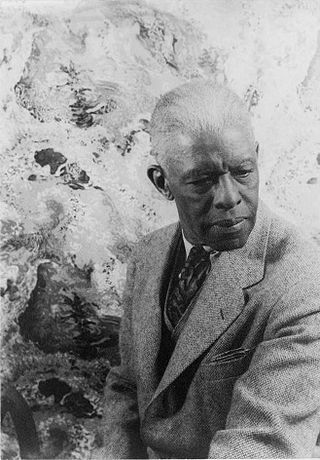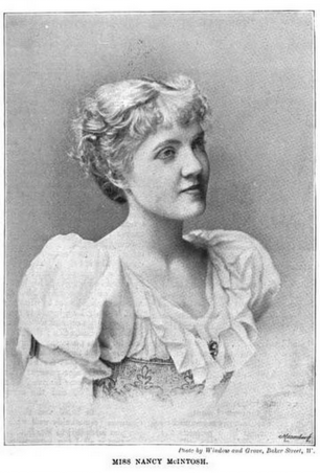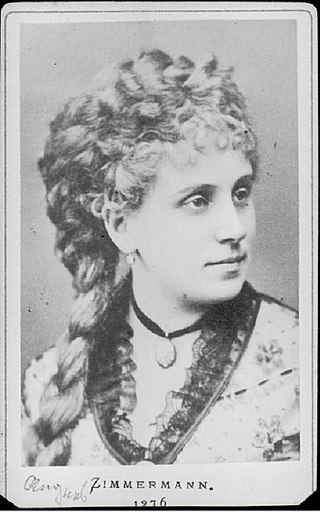
Lillian Russell was an American actress and singer. She became one of the most famous actresses and singers of the late 19th and early 20th centuries, praised for her beauty and style, as well as for her voice and stage presence; a reviewer referred to her as "the most beautiful actress of the legitimate stage."

Grace Melzia Bumbry was an American opera singer, considered one of the leading mezzo-sopranos of her generation, who also ventured to soprano roles. She belonged to a pioneering generation of African-American classical singers, led by Marian Anderson. She was recognized internationally when Wieland Wagner cast her for the 1961 Bayreuth Festival as Venus in Tannhäuser, the first black singer to appear at the festival.

Roland Wiltse Hayes was an American lyric tenor and composer. Critics lauded his abilities and linguistic skills demonstrated with songs in French, German, and Italian. Hayes’ predecessors as well-known African-American concert artists, including Sissieretta Jones and Marie Selika, were not recorded. Along with Marian Anderson and Paul Robeson, Hayes was one of the first to break this barrier in the classical repertoire when he recorded with Columbia in 1939.

María Teresa Gertrudis de Jesús Carreño García was a Venezuelan pianist, soprano, composer, and conductor. Over the course of her 54-year concert career, she became an internationally renowned virtuoso pianist and was often referred to as the "Valkyrie of the Piano". Carreño was an early adopter of the works of one of her students, American composer and pianist Edward MacDowell (1860–1908) and premiered several of his compositions across the globe. She also frequently performed the works of Norwegian composer and pianist Edvard Grieg (1843–1907). Carreño composed approximately 75 works for solo piano, voice and piano, choir and orchestra, and instrumental ensemble. Several composers dedicated their compositions to Carreño, including Amy Beach and Edward MacDowell.

Sir Isidor George Henschel was a German-born British baritone, pianist, conductor, composer and academic teacher. First trained as a pianist, he was a concert singer who sometimes sang to his own accompaniment. He was a close friend of Johannes Brahms. His first wife Lillian was also a singer. He was the first conductor of both the Boston Symphony Orchestra and the Royal Scottish National Orchestra. He taught at the Institute of Musical Art in New York City.

Amanda Christina Elizabeth Aldridge, also known as Amanda Ira Aldridge, was a British opera singer and teacher who composed love songs, suites, sambas, and light orchestral pieces under the pseudonym of Montague Ring.

Nancy Isobel McIntosh was an American-born singer and actress who performed mostly on the London stage. Her father was a member of the South Fork Fishing and Hunting Club, which had been blamed in connection with the 1889 Johnstown Flood that resulted in the loss of over 2,200 lives in Johnstown, Pennsylvania.

Marie Brema was a British dramatic mezzo-soprano active in concert, operatic and oratorio roles during the last decade of the 19th and the first decade of the 20th centuries. She was the first British singer to appear at the Bayreuth Festspielhaus.
Peggy Stuart Coolidge was an American composer and conductor. She was one of the first female American composers to have a recording devoted to her symphonic works, and the first American composer to have a concert devoted entirely to her works presented in the Soviet Union. Although she does not quote particular melodies, her compositional style is accessible and influenced by American folk and popular idioms; her success at creating a distinctly American musical voice places her among such figures as Charles Ives, Aaron Copland and George Gershwin.

Giuseppe Campanari was an Italian-born operatic baritone and cellist. He later became an American citizen.

Mana-Zucca was an American actress, singer, pianist and composer.

Agnes Marie Jacobina Zimmermann was a German concert pianist and composer who lived in England.

Ethel Liggins was a British pianist, conductor and composer. A student of Theodor Leschetizky, she became widely known as the ‘Paderewski of woman pianists’ and established herself as one of the first female conductors.

Charles William Clark was an American baritone singer and vocalist teacher. He is generally regarded as the first American baritone singer to be famous in Europe, and as one of the greatest baritone singers of all time. He sang to great acclaim at the major opera houses of Europe and America, appearing in a wide variety of roles from the Italian, French and German repertoires that ranged from the lyric to the dramatic.

Jane Elizabeth Kempton was an American contralto opera solo singer who had an active career spanning over fifty years starting in 1850. She sang in hundreds of performances across the United States and Europe during her long career.

Minuetta Shumiatcher Borek Kessler was a Russian-born Canadian and later American concert pianist, classical music composer, and educator. A child prodigy, she performed her first composition at a recital at the age of 5 in Calgary, Alberta, Canada, and went on to study at the Juilliard School in New York City. She composed hundreds of pieces, including music for piano, violin, voice, flute, clarinet and cello, as well as for chamber ensembles. She performed all over Canada and in Boston and New York, including performances at Carnegie Hall and The Town Hall, and with the Boston Civic Symphony and the Boston Pops. The New York Times called her "a rare phenomenon among the younger pianists of today – more musician than pianist". She also taught musical composition to young children, creating and patenting a game called "Staftonia" for this purpose.

Lucia Dunham was an American voice teacher, classical soprano, and academic writer on singing and diction who is chiefly remembered as a longtime professor of vocal performance at the Juilliard School from 1922-1956.

Gertrude Franklin was an American singer and music educator. Born Virginia H. Beatty, she was better known to the musical world as Gertrude Franklin, a name she took when she first became a professional singer. In private life, she was known as Virginia Beatty Salisbury. For a period of about 30 years, Franklin sang in concert and oratorio in many cities. She had the largest repertoire of any American singer in her day, also the largest collection of arias and orchestra scores for the concert stage. After marriage, she gave up concert work and became one of the most widely- and favorably-known of Boston's vocal teachers.

Christine Nielson Dreier was an American concert and oratorio singer, a contralto of wide range. She was soloist in Chicago's First Presbyterian Church for 18 years. Dreier also performed at the Exposition Universelle and the World's Columbian Exposition.

Vera C. Curtis was an American soprano and voice teacher. Educated at the New England Conservatory and the Institute of Musical Art, she was the first singer who was trained exclusively in the United States to become a principal singer at the Metropolitan Opera (Met); performing with that company from 1912 through 1920. She created roles in two world premieres staged at the Metropolitan Opera House: Lise in Damrosch's Cyrano in 1913 and Queen Carolina in Giordano's Madame Sans-Gêne in 1915. She remained active as an opera and concert singer in the 1920s, notably portraying the title role in Verdi's Aida for the inaugural performance of the Philadelphia Grand Opera Company in 1926. Her final appearance in an opera was as Venus in Wagner's Tannhäuser in a 1929 touring production of the opera staged by the Cincinnati Opera.



















